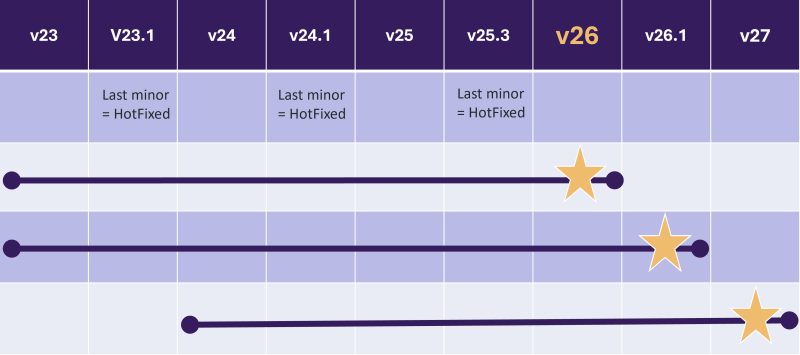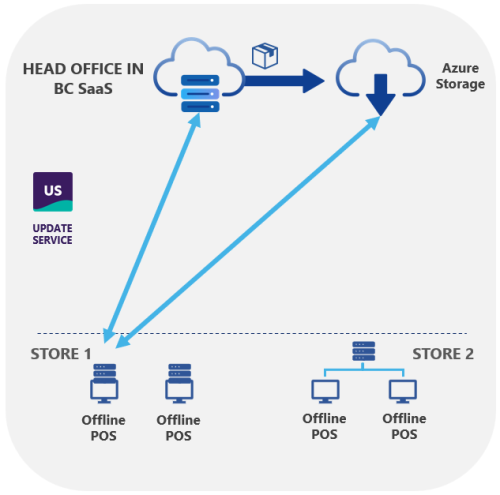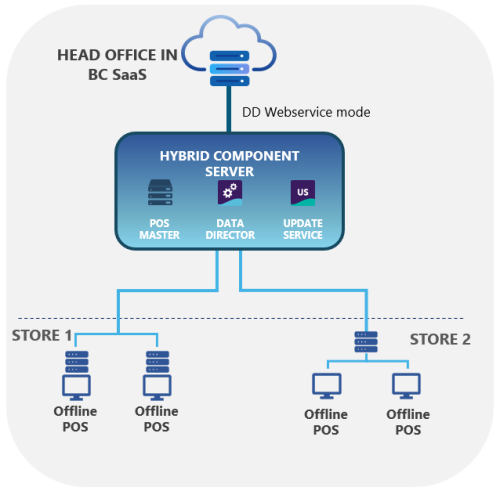In this article
Web Replication using Azure Storage (recommended)
In SaaS there are two deployment options available for offline POS, the recommended option of Web Replication using Azure Storage and the option of using Hybrid Component Server. These two options are described in the sections below.
Note: LS Retail recommends that you use Web Replication using Azure Storage to run offline POS.
|
Offline POS with Web Replication using Azure Storage |
Hybrid Component Server |
Hybrid Component Server (HCS)
In order to solve the issue of how to run an offline POS when the HO is in SaaS, LS Retail started offering the Hybrid Component Server (HCS) as a solution in earlier LS Central versions.
The HCS is a collection of tools, Data Director, Update Service, and a template database called POSMaster, and methods that help you manage your customers' offline environment.
The Data Director is used to pull down master and setup data from Head Office in SaaS, and here LS Retail added capabilities to DD to use web services to communicate with SaaS.
The Update Service is used to create the POSMaster database that is also used as a template database when the installer for the offline POS is created.
Note: We recommend that you set up the offline POS using Azure Storage replication, but the HCS (including the DD) will still be available.
Web Replication using Azure Storage (recommended)
With the introduction of Web Replication using Azure Storage in LS Central version 24.0, LS Retail was able to offer a new method of running the offline POS that did not rely on the Hybrid Component Server. In this model, the Scheduler runs in Head Office in SaaS and Web Replication using Azure Storage is used to push master and setup data to the offline POS. LS Retail recommends that you always use Update Service to create the offline POS as this makes POS maintenance easier when you roll out updates to the POSs.
Note: Currently, Update Service must be hosted on-premises or on an Azure VM, but LS Retail plans to offer Update Service as an Azure Service, making the offline POS a fully cloud-hosted solution.
The benefits of running the offline POS using Web Replication using Azure Storage are:
- Less expensive to run since the customer does not have to maintain and run the Hybrid Component Server.
- Simpler to set up than the HCS.
- Simpler to upgrade and stay current as you do not need to upgrade the HCS first. POS is independent of upgrades of HCS and Head Office in SaaS.
Backwards compatibility
Currently LS Retail supports offline POS with backwards compatibility of three major versions for 18 months.

In LS Central version 26 we are testing the offline POS communication with Head Office in past three major versions. For example, for users running version 26, compatibility is tested back to version 23. This means you can safely run the offline POS across these versions. The same applies if you update to LS Central 26.1, that version still works with offline POS versions back to version 23.
When Head Office is updated to version 27, LS Retail recommends to have the offline POS at least on version 24.
Handling fixes and minor updates
If an issue requires a fix, the fix is implemented three major versions back but only in the latest minor version. This means that if the current version is LS Central version 26.0, the versions receiving fixes are 23.1, 24.1, and 25.3.
See also
Web Replication Using Azure Storage

